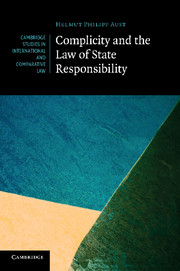Book contents
- Frontmatter
- Contents
- Foreword
- Preface
- Table of cases
- Abbreviations
- 1 Introduction
- 2 Complicity between bilateralism and community interest
- 3 Complicity and the international rule of law
- 4 Complicity in customary international law
- 5 The concept of complicity in Article 16 ASR
- 6 The consequences of complicity
- 7 Complicity and aggravated responsibility
- 8 A network of rules on complicity
- General conclusions
- Bibliography
- Index
2 - Complicity between bilateralism and community interest
Published online by Cambridge University Press: 07 September 2011
- Frontmatter
- Contents
- Foreword
- Preface
- Table of cases
- Abbreviations
- 1 Introduction
- 2 Complicity between bilateralism and community interest
- 3 Complicity and the international rule of law
- 4 Complicity in customary international law
- 5 The concept of complicity in Article 16 ASR
- 6 The consequences of complicity
- 7 Complicity and aggravated responsibility
- 8 A network of rules on complicity
- General conclusions
- Bibliography
- Index
Summary
Specific international rules do not exist in a vacuum. Rather, they are necessarily connected to the greater whole of the international legal system. This implies that new rules develop in a certain framework. Such a framework is often analysed with respect to the structure of the international legal system which is in place at a given time. A rule on responsibility for complicit States is no exception in this regard. In fact, the law of State responsibility is particularly characteristic of the prevailing general concept of international law because, as Pierre-Marie Dupuy has remarked, every epoch will project therein its concept of the relations between the subjects of international law, their acts and the community to which these actors belong.
As was hinted at in the introduction, two different ‘paradigms’ are usually considered to be relevant for an analysis of the problem of complicity: the traditional bilateralism of international law and its alleged subsequent turn towards the protection of community interests. The legal status of the rule embodied in Article 16 ASR is not yet conclusively settled. It is therefore important to gain an awareness of the conceptual significance of the provision and to consider how it fits into the current structure of the international legal order. In this chapter, we will be particularly interested in the way the two conflicting views on the structure of international law impact upon our problem: is it really the case that traditional bilateralism stands in the way of imposing responsibility for complicity (section 1)? And to what extent has the turn towards community interest contributed to the recognition that complicity is no longer to be tolerated in international law (section 2)?
- Type
- Chapter
- Information
- Complicity and the Law of State Responsibility , pp. 11 - 49Publisher: Cambridge University PressPrint publication year: 2011



